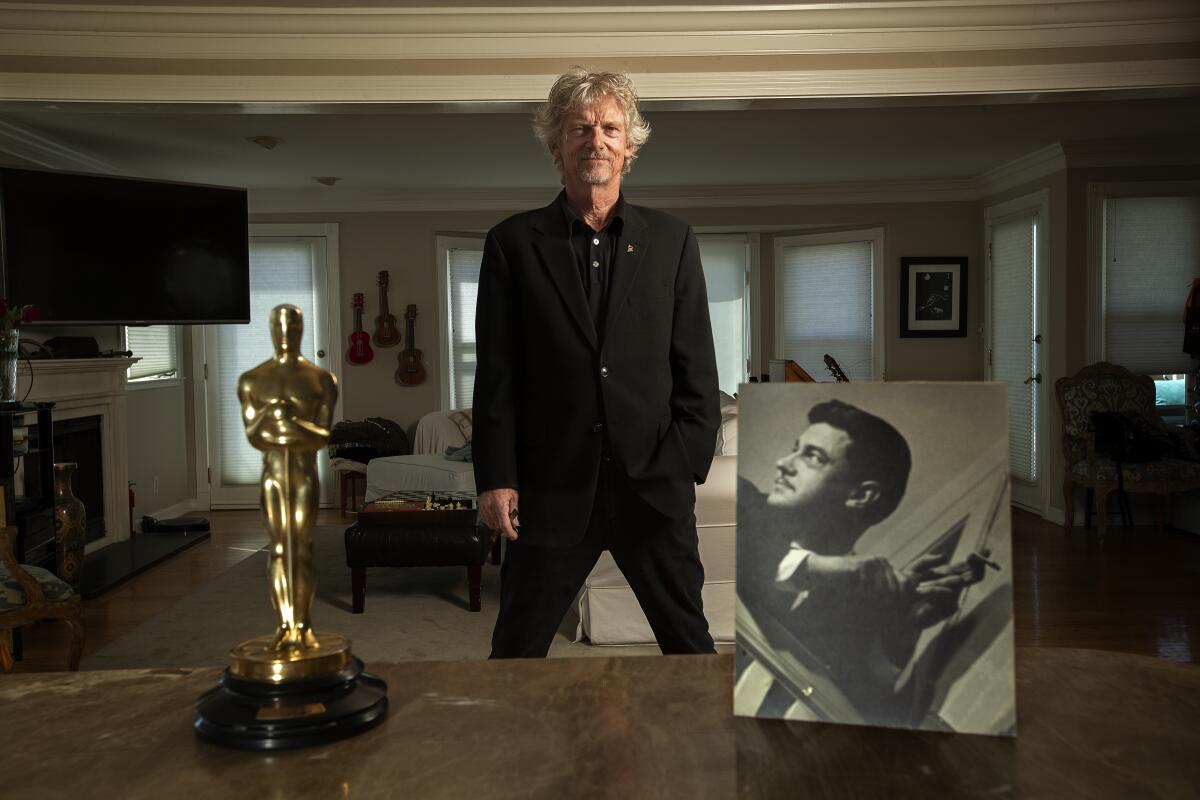The son of famed director Preston Sturges searches for the dad he never knew

- Share via
There is a haunting photograph near the end of the new book “Preston Sturges: The Last Years of Hollywood’s First Writer-Director,” by Nick Smedley and the filmmaker’s youngest son, Tom. It’s a picture of the then-3-year-old, grief-stricken and sitting in the backyard of his family’s Los Angeles house with his hands covering his face.
“There was a lot of debate about whether to include that picture,” Sturges, now 63, said recently. “You see that picture and you’re like, ‘What is this?’”
The photo is explained two pages later; it was taken by his mother, Sandy, after she told him his father had died. “She tried to explain to him that daddy was in heaven now, watching down on his family and with them every day, but never to be seen again,” Smedley writes in the book.
“It makes me sad now,” Tom Sturges, a former music executive, said with a wistful tone in his voice.
He had not seen his father, who won an Oscar for the screenplay for his 1940 directorial debut, “The Great McGinty,” since he was a year old. The family was living in Paris when his mother took him and his older brother, Preston Jr., back to Los Angeles in 1957.
“I remember getting cards,” said Sturges. “My mom filled my head with stories about who he was and what he was like. I pursued the myths. I imagined that he would have been a great dad and loving guy. We would’ve sailed boats and played baseball and all that stuff. As I got to find out who he was, that probably wasn’t going to happen.”
Brilliant filmmaker
Preston Sturges was a brilliant writer-director. Before “The Great McGinty,” he wrote the scripts for such classics as William Wyler’s “The Good Fairy” in 1935, the 1937 screwball comedy “Easy Living” and the haunting 1940 holiday film “Remember the Night.”
But his output at Paramount from 1940-44 was perhaps the most extraordinary in film history. Besides “The Great McGinty,” he wrote and directed such comedic masterpieces — sophisticated, fast-talking satires of American manners — as 1940’s “Christmas in July,” 1941’s “The Lady Eve,” 1942’s “Sullivan’s Travels,” 1942’s “The Palm Beach Story,” 1944’s “The Miracle of Morgan’s Creek” and 1944’s “Hail the Conquering Hero.”
After he left Paramount in 1944, Sturges would make only four more films before his death at age 60 in 1959. All were box office failures, though 1948’s “Unfaithfully Yours” has gained in reputation and popularity over the decades.
“When he was on top, it must have been the greatest 10 years you could possibly have,” said Tom Sturges. “First of all, the creative freedom he figured out and culminates to me with ‘Miracle of Morgan’s Creek,’ where he’s only finished 50 pages of the script when Paramount says, ‘Go.’ So, he’s writing at night and shooting in the day, always about 40 to 50 pages a day. He’s running a restaurant and an engineering company, building a boat and falling in love every other day, I’m sure.”
Sturges is thrilled that people are still talking about his father’s films nearly eight decades after they were made. He notes that those movies were ahead of their time when it came to feminism.
“The reason for this is because if you look at the roles he gave to these women — Barbara Stanwyck in ‘The Lady Eve’ and ‘Remember the Night,’ Jean Arthur in ‘Easy Living,’ Claudette Colbert in ‘The Palm Beach Story’ — these are woman who have taken control and made it their own,” Sturges said. “Whether they are making millions or swindling somebody or whatever, they are smart, funny and sexy women.”
Sturges is definitely the keeper of his father’s flame. His older brother, who is a writer, “still believes he will eclipse my dad,” he says. “I, on the other hand, have accepted the fact that my dad is uneclipsible.”
Preston Sturges was his own worst enemy. He drank heavily. He was married four times and often cheated on his spouses, including Sandy. He spent money like it would last forever.
Sturges recalled asking his mom, “‘What was the hardest thing about living with Daddy?’ What do you think the answer was? Jealousy. She said if a waiter made her laugh when they were at the restaurant, he could sink into a black rage that could last for days.”
Origins of book
It was Smedley who reached out to Tom Sturges about doing the book. “I said, ‘I think there’s 15 or 17 books on my dad, it’s covered,’” he noted. However, when his mother died in 2006 at age 79, Sturges found a treasure trove of letters, diaries and even his father’s canceled checks.
“I said, ‘If you want to write a book about the last 10 years, I’m all in,’” said Sturges. “He’s the historian. I said to him, ‘What I am going to do is write every memory I have that’s come to me via my mom.’”
Preston Sturges was riding high at Paramount in 1944 when he left, after the studio re-edited “The Great Moment,” a dramatic film starring Joel McCrea about a Boston dentist who discovered the use of ether as general anesthesia. The picture was not a hit with critics or audiences.
“This is when you start to see the stubbornness,” said Tom Sturges.
No one could talk his father out of an option in his contract that stated he could exit the studio within 30 days of the release of a movie. His father “left the sanctity of the womb of Paramount where he had been,” Sturges said. “Nobody could control him.”
As Sturges described it, his dad left “this beautiful aquarium, jumps into a shark tank and ends up with Howard Hughes. When they formed their picture company, [it was] 51% Howard Hughes, 49% my dad. Bad decision No. 1, holding on to that clause. Bad decision No. 2, 51/49 with Howard Hughes.”
Preston Sturges knew the eccentric millionaire because he frequented the filmmaker’s famed Sunset Boulevard restaurant the Players Club. “Howard would come to the restaurant,” Tom Sturges said. “They were just like two moguls, drinking too much, smoking too much, chasing broads.”
Their collaboration, 1947’s “The Sin of Harold Diddlebock,” starring silent comic legend Harold Lloyd, was a bust on release. Hughes took it out of circulation, reshot scenes, re-edited it and released it in 1950 as “Mad Wednesday.” No one was mad for it.
Darryl F. Zanuck then hired the filmmaker, giving him a hefty salary. “This is terrible, terrible decision No. 3,” noted Tom Sturges. “Darryl Zanuck said, ‘I want you to make your own movies. But I also want all the other people [at the studio] to be able to talk to you about their films.’ In other words, a mentor. And my dad goes, ‘No, I only want to do movies.’ I wish there was a positive word for it, but I think it’s a sort of arrogance.”
Preston Sturges’ career was basically over with the release of the 1949 Betty Grable bomb “The Beautiful Blonde From Bashful Bend,” the writer-director’s only movie shot in color.
The Players Club was also losing money. So, instead of selling it, Sturges rebuilt it. “He puts a circular stage on top,” lamented his son. “He’s losing money because the menu is so broad. So, he cut down to one [type] of meal per night. Thursday is chicken. Friday it’s fish.”
The club closed in 1953 when the IRS put a lien on it and sold off the contents to pay back taxes.
Sturges married Sandy, who was 30 years his junior, in 1951. They welcomed Preston Jr. in 1953 and Tom, who was born in 1956 in Paris, where the family was then living. There were opportunities, but Sturges Sr. seemed to sabotage them, including doing a movie based on George Bernard Shaw’s “The Millionairess,” starring Katharine Hepburn.
“Apparently, she smelled alcohol,” said his son. “That turned her off. He had a beautiful thing going and had too much to drink.”
He wrote a lot of scripts; deals fell apart. Preston Sturges did manage to write and direct one last film, “The French, They Are a Funny Race,” which was released in the U.S. in 1957 to bad reviews. “It’s not a good movie,” said his son. His father also had a small role as an actor in the lightweight 1958 Bob Hope comedy “Paris Holiday.”
He tried his luck with the theater, but he ran into difficulties directing the Broadway play “The Golden Fleecing” in 1959. “The production was already falling apart under Sturges’ insensitive and inept supervision,” Smedley writes. “He had fallen out with his lead even before rehearsals had started. He had alienated the author with sarcastic references, he had argued with his producers.”
Sturges and Sandy never saw each other again after she left in 1957, though they never fell out of love — even when he cheated on her — and constantly wrote letters.
“Once they were gone, Sturges never had enough money to bring them back, nor to go over himself on visits,” Smedley writes of the filmmaker’s family. “Even when he was in New York, it was still too costly to engineer a family reunion.”
Sandy Sturges wrote a letter in 1958 begging her husband to return to Los Angeles. “Come home and have another baby,” noted Tom Sturges. “Let’s have another child. You can name him anything you like.”
Preston Sturges was writing his autobiography at the Algonquin Hotel in New York City when he died of a heart attack. Sandy Sturges took his unfinished work and edited it as “Preston Sturges by Preston Sturges.”
After completing his book, Tom Sturges noted that the lifelong search for his father was over. “I’m done,” he said. “I called my wife when I was getting ready to come home the other day and said, ‘I have learned everything I could possible learn.”’
More to Read
Sign up for our Book Club newsletter
Get the latest news, events and more from the Los Angeles Times Book Club, and help us get L.A. reading and talking.
You may occasionally receive promotional content from the Los Angeles Times.






